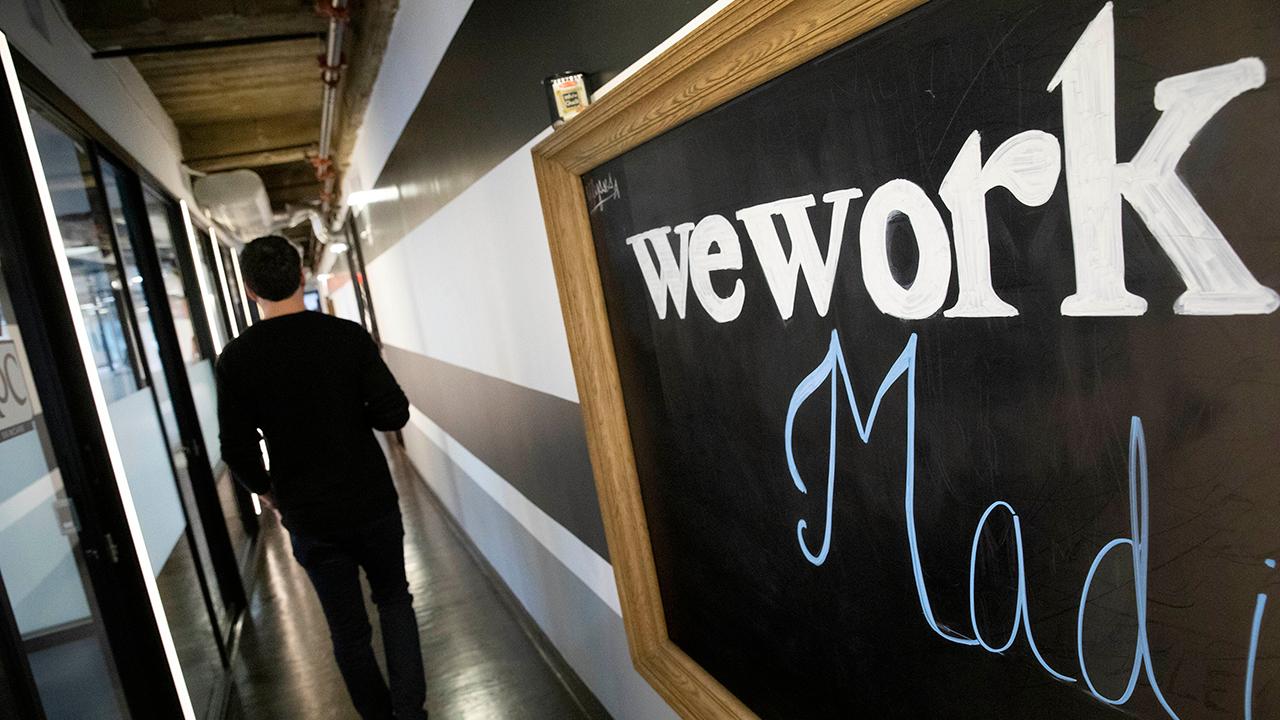WeWork’s loss balloons to $1.25B
Office-space startup WeWork lost $1.25 billion in the third quarter as expenses far outpaced revenue growth, draining the company’s cash ahead of a bailout by SoftBank Group Corp. last month.
We Co., as the parent company is officially known, said Wednesday in a report to debtholders that revenue surged 94% in the three months ended Sept. 30 to $934 million compared with the year-earlier period.
The report of the heavy dose of red ink compares with WeWork’s prior record loss of $638 million, posted in the second quarter, and is more than double the $497 million loss reported in same year-earlier period.
Behind the ballooning losses were many of the very concerns investors had with the company earlier this fall, when it attempted an initial public offering.
GET FOX BUSINESS ON THE GO BY CLICKING HERE
Once considered the most valuable startup in the U.S. with a valuation of $47 billion, WeWork’s attempt to go public was widely panned by potential investors given concerns over its mounting losses, as well as the erratic management style of the now-departed chief executive, Adam Neumann. With little apparent demand from investors, the IPO was pulled and Mr. Neumann was forced out.
For most of its existence, WeWork has been focused on revenue growth, impressing many analysts and observers with its ability to consistently double sales year after year.
But with the focus internally set on the top line, the nine-year-old company was never able to deliver its long-running set of pledges that it would rein in costs. Spending consistently rose, typically as fast as or even faster than revenue, as the New York company blanketed the world with glassy offices marked by a hip interior design and ample fresh cucumber water. The losses kept growing ahead of the IPO, at the very time that startups usually endeavor to show they are shrinking.
HERE'S WHAT WEWORK IS GIVING SOME LAID-OFF EMPLOYEES
In the third-quarter report, WeWork said expenses rose at a faster rate amid rapid growth in areas like leasing costs and “new market development.” The latter is a wide-ranging category that included numerous areas of expansion pushed by Mr. Neumann, including a slew of tech companies WeWork acquired.
The company also reported a $197 million charge related to asset impairments as it wrote down the costs of businesses it acquired over the past couple of years, according to a person familiar with the charge. Costs related to its attempted IPO, other deals and its restructuring totaled $83 million.
The abandoned IPO and subsequent two months have been a tremendously tumultuous period for WeWork.
The IPO was supposed to raise up to $10 billion in equity and debt, giving the company cash to keep expanding.
But without the listing, WeWork nearly ran out of cash amid the accelerated spending.
That led it to take a rescue package from Softbank. The Japanese conglomerate committed $6.5 billion in debt and equity to give it nearly 80% ownership in WeWork.
Since Mr. Neumann left in late September, the company has pivoted rapidly to try to cut costs. SoftBank installed a new executive chairman—Marcelo Claure—and it has begun to search for a new chief executive, holding talks with T-Mobile US Inc. CEO John Legere, people familiar with the matter have said.

Adam Neumann, co-founder and chief executive officer of WeWork, speaks in Shanghai, April 12, 2018. (Jackal Pan/Visual China Group via Getty Images, FILE)
Layoffs of thousands of the company’s more than 13,000 employees are expected soon, and company executives have said they are trying to sell almost every company WeWork acquired in the past two years. In a presentation to investors posted on its website last week, the company described its business model as “decentralized” in the past two years and said now it hopes to be “centralized.”
The quarter’s numbers also epitomize the growing scale of losses among many large startups, where executives and venture-capitalist investors focused for years on growing revenue, with less attention to costs.
Uber Technologies Inc. reported a loss of $3.7 billion in the 12 months before its May IPO—the largest ever for a U.S. startup before a public offering—while Lyft Inc. reported $911 million in losses in the year before its listing.
WeWork’s losses aren’t far behind Uber’s. With its latest quarter, WeWork has now lost $2.9 billion in the 12 months ending in September. It is on pace for well over $3 billion in losses for 2019.
CLICK HERE TO READ MORE ON FOX BUSINESS
The public markets have appeared far less enamored with the strategy than venture capital investors expected. Lyft and Uber both have been shunned by public-market investors since their IPOs earlier this year. The ride-hailing companies’ stocks are down about 40% from where their offerings priced.
Write to Eliot Brown at eliot.brown@wsj.com




















